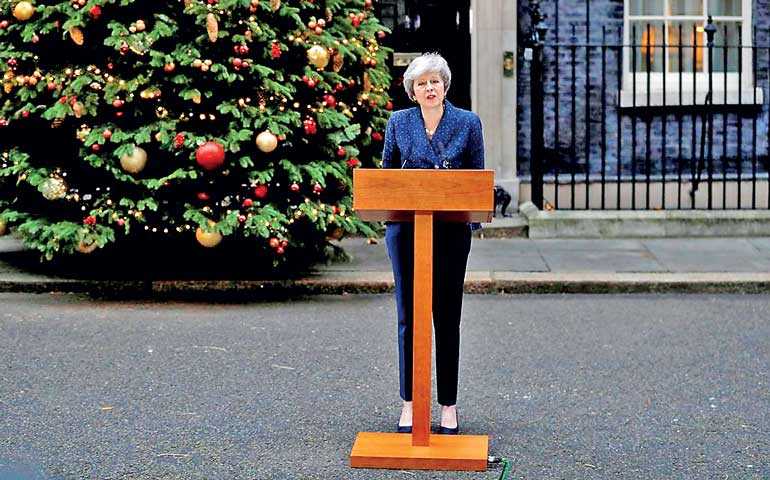Thursday Feb 19, 2026
Thursday Feb 19, 2026
Thursday, 13 December 2018 00:00 - - {{hitsCtrl.values.hits}}

London (Reuters); Prime Minister Theresa May vowed to fight for her job on Wednesday after Conservative lawmakers triggered a challenge to her leadership, saying a change could jeopardise Britain’s planned divorce from the European Union.
With less than four months until the United Kingdom is due to exit on 29 March, Brexit has been plunged into chaos with options ranging from a potentially disorderly no-deal departure to another referendum that could reverse it.
Speaking outside her Downing Street residence hours before the vote on her leadership, May said she would battle for her premiership with everything she had.
In a stark warning to Brexit-supporting opponents who instigated the challenge, May said if they toppled her then the EU exit would have to be delayed and perhaps even stopped.
“A new leader wouldn’t be in place by the 21 January legal deadline, so a leadership election risks handing control of the Brexit negotiations to opposition MPs (lawmakers) in parliament,” said May. “A new leader wouldn’t have time to renegotiate a withdrawal agreement and get the legislation through Parliament by 29 March. So one of their first acts would have to be extending or rescinding Article 50, delaying or even stopping Brexit when people want us to get on with it,” she said.
A secret ballot will be held between 1800 and 2000 GMT on Wednesday in a room at the House of Commons, and an announcement made as soon as possible afterwards.
According to the rules, May could be toppled if 158 of her 315 lawmakers vote against her, though a significant rebellion could also end her career. At least 75 Conservative lawmakers had expressed public support for her by 0940 GMT.
Brexit is Britain’s most significant political and economic decision since World War Two though pro-Europeans fear it will divide the West as it grapples with the presidency of Donald Trump and growing assertiveness from Russia and China.
The outcome will shape Britain’s $2.8 trillion (£2.24 trillion) economy, have far reaching consequences for the unity of the United Kingdom, and determine whether London can keep its place as one of the top two global financial centres.
The British pound, which has lost 25 cents against the US dollar since the 2016 referendum, fell on the confidence vote but then rose to 1.2528 on news Brexit might have to be delayed.
May, a vicar’s daughter who voted to remain in the EU, won the top job in the turmoil that followed the 2016 EU referendum but promised to implement Brexit, while keeping close ties to the bloc, as a way to heal a divided nation.
Widely praised for a punishing work ethic and a dutiful approach to solving the Brexit divide, May’s premiership has been characterised by obduracy in the face of frequent crises.
Ever since formally triggering the Brexit divorce in March 2017, May has tried to find a way to keep Britain closely aligned with the EU after its exit - the essence of the divorce deal struck with Brussels last month.
But on Monday she abruptly pulled a parliamentary vote on her deal in the face of ridicule from lawmakers. She then rushed to Europe to seek assurances from EU leaders about the deal. The EU has insisted it will not re-negotiate but some of the bloc’s leaders have suggested Britain could still change its mind on leaving. Brexit-supporting lawmakers in her party have accused May of betraying the people’s vote in negotiations while opponents say she has negotiated a deal that is the worst of all worlds - out of the EU but with no say over many rules it has to abide by.